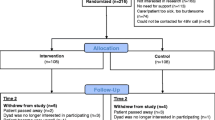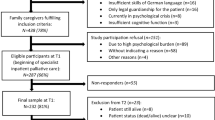Abstract
Purpose
This study investigated the effectiveness of a structured telephone intervention for caregivers of people diagnosed with poor prognosis gastrointestinal cancer to improve psychosocial outcomes for both caregivers and patients.
Methods
Caregivers of patients starting treatment for upper gastrointestinal or Dukes D colorectal cancer were randomly assigned (1:1) to the Family Connect telephone intervention or usual care. Caregivers in the intervention group received four standardized telephone calls in the 10 weeks following patient hospital discharge. Caregivers’ quality of life (QOL), caregiver burden, unmet supportive care needs and distress were assessed at 3 and 6 months. Patients’ QOL, unmet supportive care needs, distress and health service utilization were also assessed at these time points.
Results
Caregivers (128) were randomized to intervention or usual care groups. At 3 months, caregiver QOL scores and other caregiver-reported outcomes were similar in both groups. Intervention group participants experienced a greater sense of social support (p = .049) and reduced worry about finances (p = .014). Patients whose caregiver was randomized to the intervention also had fewer emergency department presentations and unplanned hospital readmissions at 3 months post-discharge (total 17 vs. 5, p = .01).
Conclusions
This standardized intervention did not demonstrate any significant improvements in caregiver well-being but did result in a decrease in patient emergency department presentations and unplanned hospital readmissions in the immediate post-discharge period. The trend towards improvements in a number of caregiver outcomes and the improvement in health service utilization support further development of telephone-based caregiver-focused supportive care interventions.


Similar content being viewed by others
References
Thomas C, Morris SM, Harman JC (2002) Companions through cancer: the care given by informal carers in cancer contexts. Soc Sci Med 54:529–544
Sharpe L, Butow P, Smith C, McConnell D, Clarke S (2005) The relationship between available support, unmet needs and caregiver burden in patients with advanced cancer and their carers. Psychooncology 14:102–114
Given BA, Given CW, Kozachik S (2001) Family support in advanced cancer. CA Cancer J Clin 51:213–231
Nijboer C, Tempelaar R, Sanderman R et al (1998) Cancer and caregiving: the impact on the caregiver’s health. Psycho Oncol 7:3–13
Soothill K, Morris SM, Harman J et al (2001) Informal carers of cancer patients: what are their unmet psychosocial needs? Health Soc Care Community 9:464–475
Pitceathly C, Maguire P (2003) The psychological impact of cancer on patients’ partners and other key relatives: a review. Eur J Cancer 39:1517–1524
Weaver FM, Perloff L, Waters T (1999) Patients’ and caregivers’ transition from hospital to home: needs and recommendations. Home Health Care Serv Q 17:27–48
Hughes LC, Hodgson NA, Muller P et al (2000) Information needs of elderly postsurgical cancer patients during the transition from hospital to home. J Nurs Sch 32:25–30
Shaw J, Harrison J, Young J et al (2013) Coping with newly diagnosed upper gastrointestinal cancer: a longitudinal qualitative study of family caregivers’ role perception and supportive care needs. Support Care Cancer 21:749–756
Siegel K, Raveis VH, Houts P, Mor V (1991) Caregiver burden and unmet patient needs. Cancer 68:1131–1140
McConigley R, Halkett G, Lobb E, Nowak A (2010) Caring for someone with high-grade glioma: a time of rapid change for caregivers. J Palliat Med 24:473–479
Richardson A, Plant H, Moore S et al (2007) Developing supportive care for family members of people with lung cancer: a feasibility study. Support Care Cancer 15:1259–1269
Driscoll A (2000) Managing post-discharge care at home: an analysis of patients’ and their carers’ perceptions of information received during their stay in hospital. J Adv Nurs 31:1165–1173
Hodges LJ, Humphris GM, Macfarlane G (2005) A meta-analytic investigation of the relationship between the psychological distress of cancer patients and their carers. Soc Sci Med 60:1–12
Goldstein NE, Concato J, Fried TR et al (2004) Factors associated with caregiver burden among caregivers of terminally ill patients with cancer. J Palliat Care 20:38–43
Northouse LL, Katapodi MC, Song L, Zhang L, Mood DW (2010) Interventions with family caregivers of cancer patients: meta-analysis of randomized trials. CA Cancer J Clin 60:317–339
Australian Institute of Health and Welfare & Australasian Association of Cancer Registries Cancer in Australia: an overview, 2012 In Cancer series no. 74. Cat. no. CAN 70.2012, AIHW: Canberra. (accessed 26 April 2014)
Bae J-M, Park J-W, Yang H-K, Kim J-P (1998) Nutritional status of gastric cancer patients after total gastrectomy. World J Surg 22:254–261
Martin L, Lagergren P (2009) Long-term weight change after oesophageal cancer surgery. Br J Surg 96:1308–1314
Maruish ME (ed) (2011) User’s manual for the SF-36v2 health survey, 3rd edn. Quality Metric Incorporated, Lincoln
Girgis A, Lambert S, Lecathelinais C (2011) The supportive care needs survey for partners and caregivers of cancer survivors: development and psychometric evaluation. Psychooncology 20:387–393
Given CW, Given B, Stommel M et al (1992) The caregiver reaction assessment (CRA) for caregivers to persons with chronic physical and mental impairments. Res Nurs Health 15:271–283
McCorkle R, Yost LS, Jepson C et al (1993) A cancer experience: relationship of patient psychosocial response to care-giver burden over time. Psychooncology 2:21–32
Gessler S, Low J, Daniells E et al (2008) Screening for distress in cancer patients: is the distress thermometer a valid measure in the UK and does it measure change over time? A prospective validation study. Psychooncology 17:538–547
Cella D. Functional Assessment of Chronic Illness Therapy (FACIT) Measurement System. Elmhurst Il. http://www.facit.org/
Boyes A, Bonevski B (2004) The supportive care needs survey: a guide to administration, scoring and analysis. Centre for Health Research & Psycho-oncology, Newcastle
Young JM, Butow PN, Walsh J et al (2013) Multicenter randomized trial of centralized nurse-led telephone-based care coordination to improve outcomes after surgical resection for colorectal cancer: the CONNECT intervention. J Clin Oncol 31:3585–3591
Schulz KF, Altman DG, Mohr D et al (2010) CONSORT 2010 Statement: updated guidelines for reporting parallel group randomised trials. BMC Med 8:18. doi:10.1186/1741-7015-8-18
Northouse L, Templin T, Mood D (2001) Couples’ adjustment to breast disease during the first year following diagnosis. J Behav Med 24:115–136
Lambert S, Jones B, Girgis A, Lecathelinais C (2012) Distressed partners and caregivers do not recover easily: adjustment trajectories among partners and caregivers of cancer survivors. Ann Behav Med 44:225–235
Chen S-C, Tsai M-C, Liu C-L et al (2009) Support needs of patients with oral cancer and burden to their family caregivers. Cancer Nurs 32:473–481
Hanratty B, Holland P, Jacoby A, Whitehead M (2007) Financial stress and strain associated with terminal cancer—a review of the evidence. Palliat Med 21(p):595–607
Maly RC, Umezawa Y, Leake B, Silliman RA (2005) Mental health outcomes in older women with breast cancer: impact of perceived family support and adjustment. Psychooncology 14:535–545. doi:10.1002/pon.869
Dumont S, Turgeon J, Allard P et al (2006) Caring for a loved one with advanced cancer: determinants of psychological distress in family caregivers. J Palliat Med 9:912–921
Viklund P, Wengström Y, Lagergren J (2006) Supportive care for patients with oesophageal and other upper gastrointestinal cancers: the role of a specialist nurse in the team. Eur J Oncol Nurs 10:353–363
Lambert S, Girgis A, Lecathelinais C, Stacey F (2013) Walking a mile in their shoes: anxiety and depression among partners and caregivers of cancer survivors at 6 and 12 months post-diagnosis. Support Care Cancer 21:75–85
Martin RCG, Brown R, Puffer L et al (2011) Readmission rates after abdominal surgery: the role of surgeon, primary caregiver, home health, and subacute rehab. Ann Surg 254:591–597
Schofield P, Ugalde A, Carey M et al (2008) Lung cancer: challenges and solutions for supportive care intervention research. Palliat Support Care 6:281–287
Ostroff J, Ross S, Steinglass P, Ronis-Tobin V, Singh B (2004) Interest in and barriers to participation in multiple family groups among head and neck cancer survivors and their primary family caregivers. Fam Process 43:195–208
Northouse LL, Rosset T, Phillips L, Mood D, Schafenacker A, Kershaw T (2006) Research with families facing cancer: the challenges of accrual and retention. Res Nurs Health 29:199–211
Acknowledgments
The researchers would like to thank the patients and caregivers who participated in this study. We thank Caroline Wildbourne, Jane-Louise Sinclair and Dr Penelope De Lacavalerie for their assistance with recruitment at their respective sites and Maryann Kurien for her research assistance. We also thank Nicholas Marsden and Emma Jane Li Sian Boles for delivering the intervention. Jane Young was supported by a Cancer Institute NSW Academic Leader in Cancer Epidemiology grant. This study was funded by National Health and Medical Research (NHMRC) Project Grant 632645.
Conflict of interest
None to declare
Author information
Authors and Affiliations
Corresponding author
Rights and permissions
About this article
Cite this article
Shaw, J.M., Young, J.M., Butow, P.N. et al. Improving psychosocial outcomes for caregivers of people with poor prognosis gastrointestinal cancers: a randomized controlled trial (Family Connect). Support Care Cancer 24, 585–595 (2016). https://doi.org/10.1007/s00520-015-2817-3
Received:
Accepted:
Published:
Issue Date:
DOI: https://doi.org/10.1007/s00520-015-2817-3




